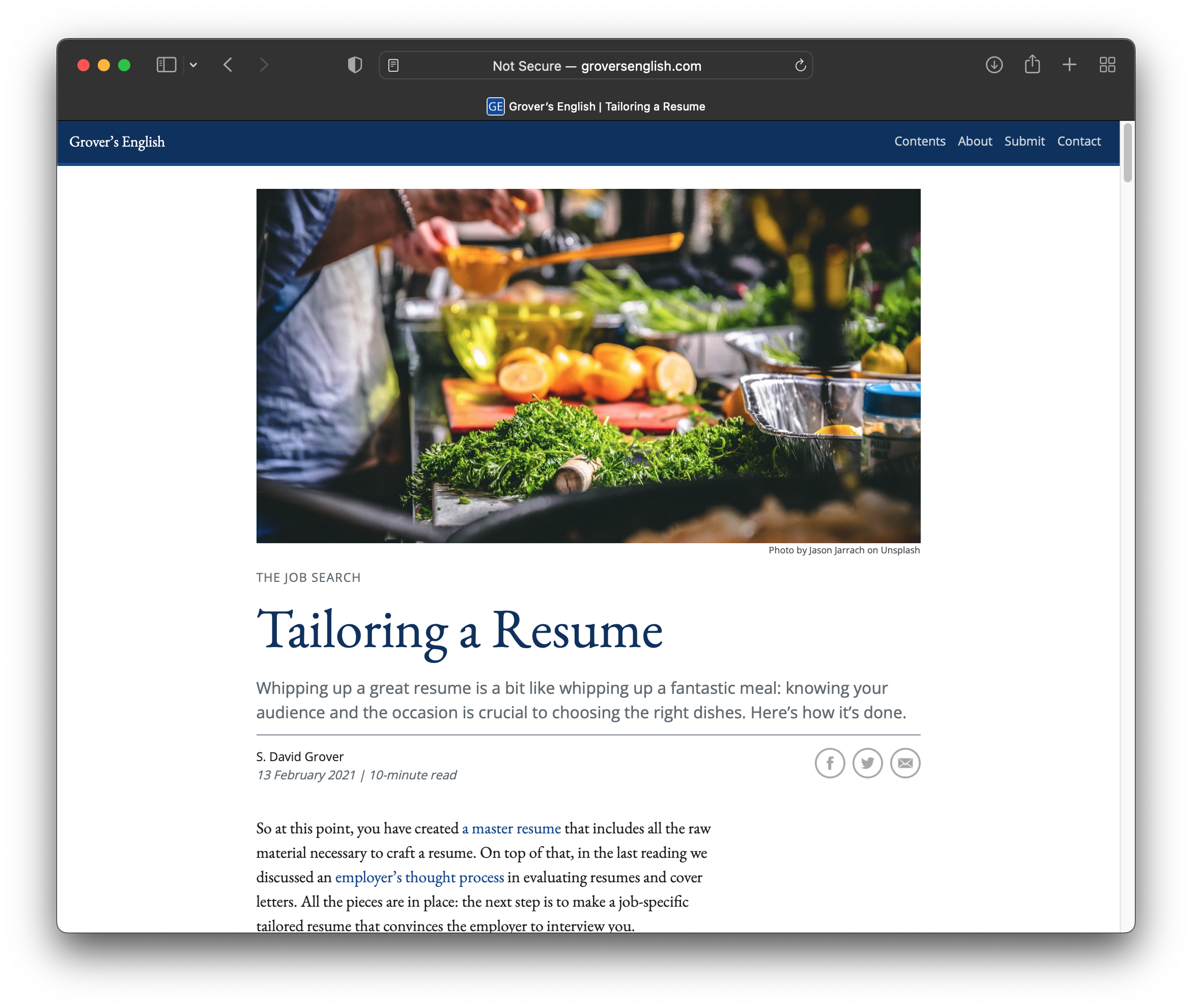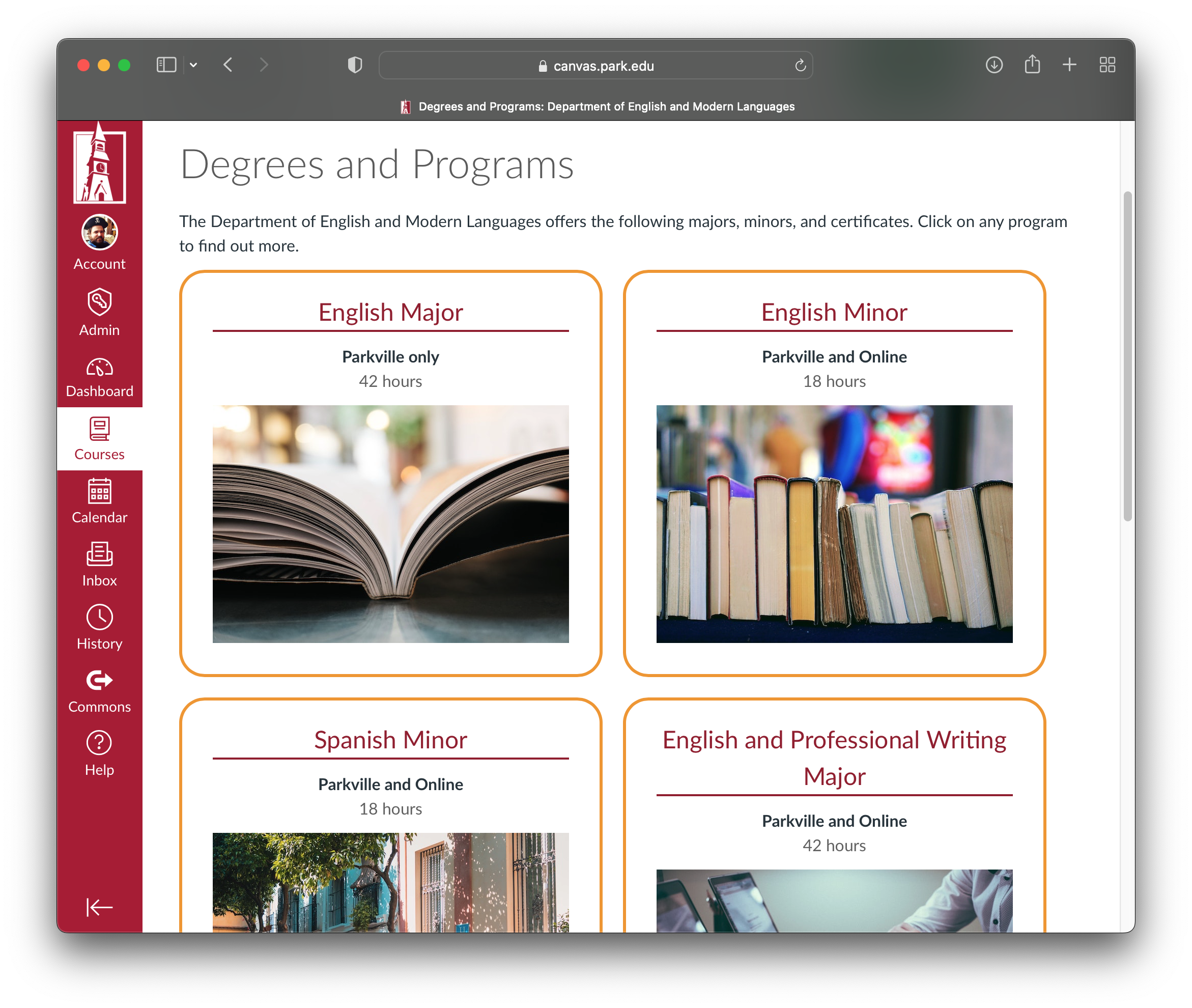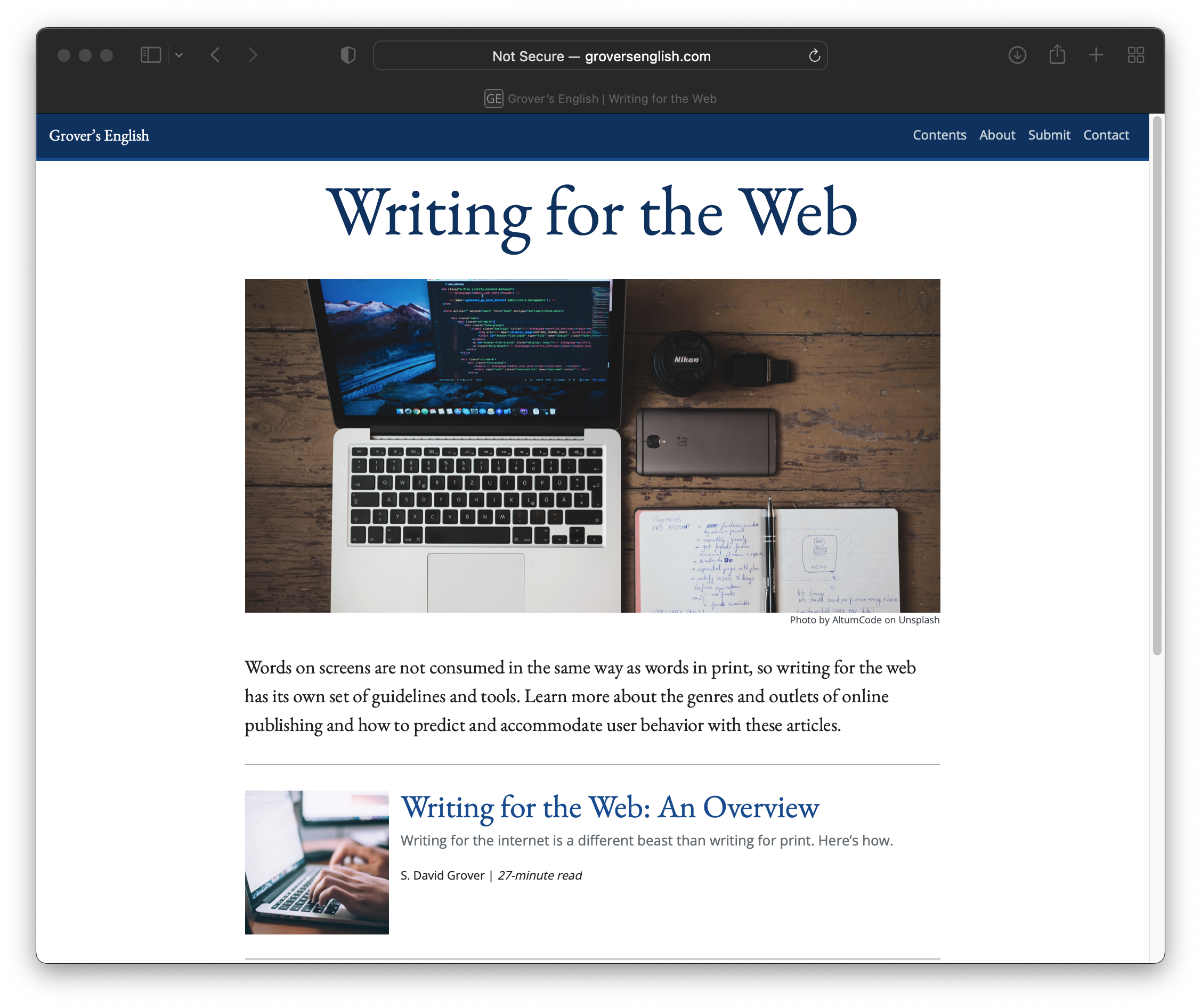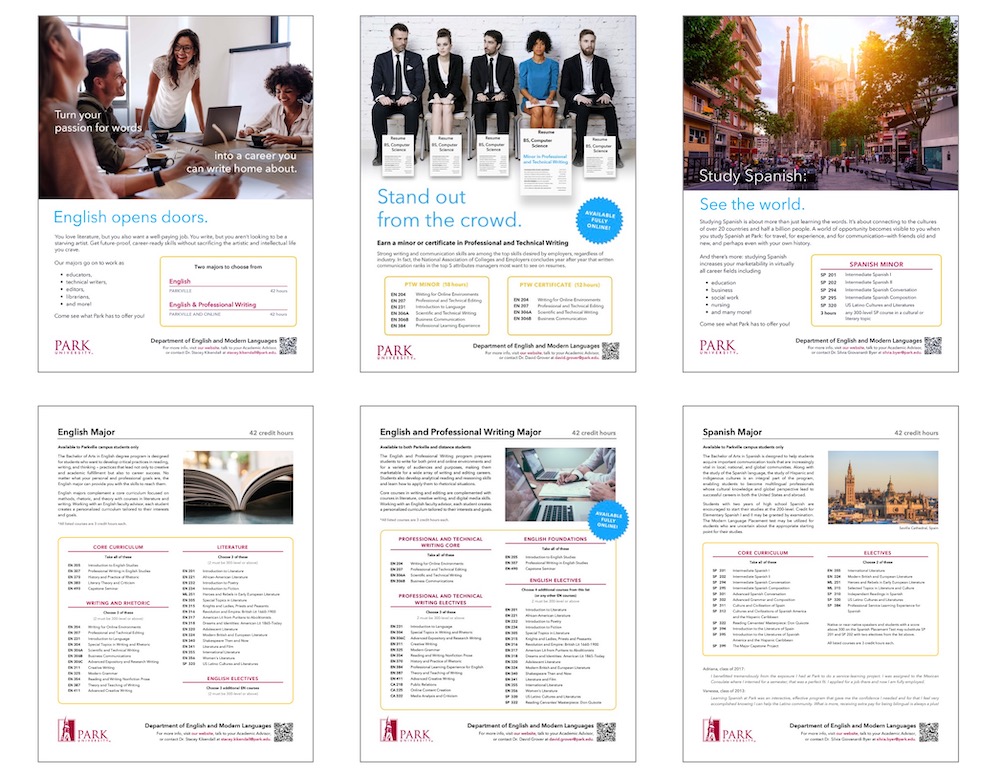
Unsplash
Skills
As a technical communicator and avid hobbyist, I have developed many skills that aid me in my work as an instructor, researcher, and professional. Frankly, I'm just in love with learning, and any excuse to practice new skills is a good one, as far as I'm concerned.
Use the following links to skip to any section.
Web Design
I first learned how to make webpages on a whim back in 2006 when I asked a roommate to teach me HTML. Since then, I've designed over a dozen websites, each one helping me to expand my skills and stay familiar with changing trends and protocols.
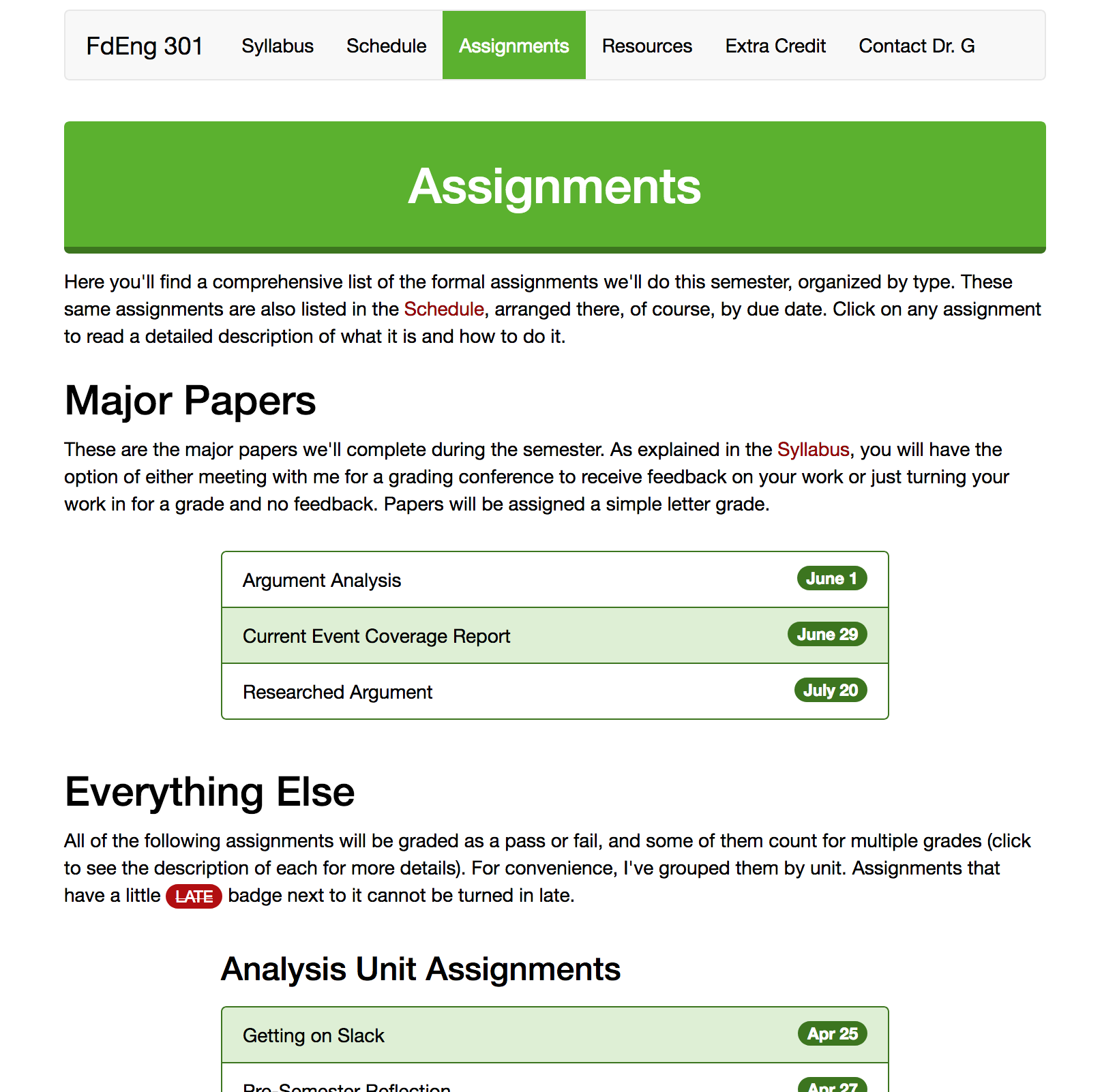
An early website I built for a junior-level writing course I taught as an adjunct
I am conversant with HTML 5 and CSS3 and, though I'm not a trained coder, I am able to wrangle PHP for many everyday uses. I typically hand-code my sites (including this one) because doing so increases my learning and keeps my markup semantic and clean, though the increasing complexity of the web makes that ever more difficult. Recently, I've been using Bootstrap, an open-source toolkit that facilitates making responsive, mobile-first, accessible websites that work across the wide variety of browsers and devices. I use Panic Nova as my preferred code editor.
In addition to this site, my current primary projects are Grover's English (my open educational resource site), Grover's Editing (my freelance editing business), and a public Canvas site for the Department of English and Interdisciplinary Studies at Park, where I work.
Accessibility and Usability
I first encountered the concepts of accessibility and usability as a doctoral student in Texas Tech's Technical Communication & Rhetoric program, and, recognizing how important they were, I quickly developed my ability to create, test, and improve accessible, usable webpages and other materials.
I endeavor to make all my websites and course materials compliant with WCAG 2.2 and Section 508. In my technical communication courses, I teach students how to perform usability testing (often using my own sites as test subjects).
My current research project on instructor presence and autonomy drew heavily on my expertise with accessibility and usability to improve the design of an online writing course and, in so doing, improve outcomes and satisfaction for both students and instructors.
Writing for the Web
In addition to creating the structure, look, and functionality of websites, I'm also adept at writing content for the web that meets audience needs by accommodating contemporary online reading and scanning patterns. As evidence, consider these articles on writing for the web — which I authored using the very principles outlined in the articles.
In fact, all of the content on Grover's English is evidence of my ability to compose readable, effective webtexts meant to inspire a commitment pattern in readers, but structured to allow readers to confidently adopt a layer-cake or F-pattern if needed.
I currently teach EN204: Writing for Online Environments, in which I help students develop their own web-writing skills. In the course, students learn about the need for structuring webtexts using the common HTML elements of headings, paragraphs, ordered and unordered lists, and more, and they learn to use Markdown, a super-simple markup language, to practice giving their writing that needed structure.
Editing
I have nearly two decades of experience as an editor. I have worked professionally in scholarly, literary, and technical editing; I teach editing to college students; and I have trained and overseen editorial interns.Currently, I run a freelance editing business, Grover's Editing.
Scholarly Editing
As an undergraduate, I completed an internship with and then continued to work for the Religious Studies Center, the publishing arm of BYU's School of Religious Education, where I became familiar with scholarly editing, professional printing, and group editorial processes.
I worked as part of a team of copy editors, typesetters, research assistants, and senior editors as we guided manuscripts from acceptance and review to fact-checking, editing for clarity, and proofreading and on through typesetting, galley-proofing, and publication. During my time with the RSC, I worked on monographs, anthologies, scholarly editions of historical texts, and an academic journal, The Religious Educator.
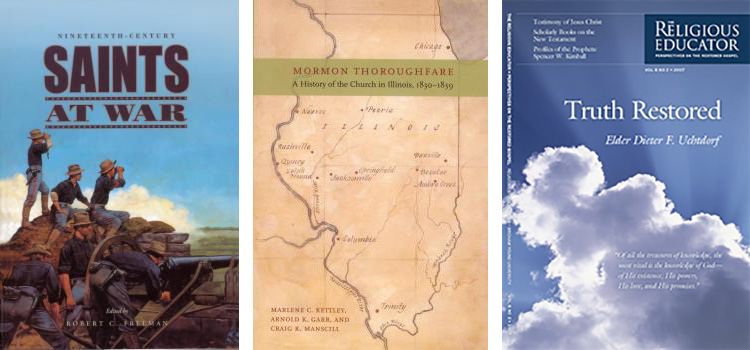
Two of over a dozen books I worked on, plus an issue of The Religious Educator.
I was even asked to research and write an article for the journal detailing the history of an endowed chair at the university.
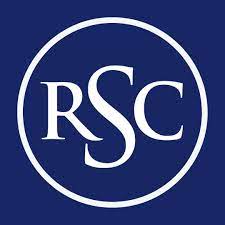
Bridges of Friendship: The Richard L. Evans Chair for Religious Understanding
The Religious Educator, 9(2), 61–72, 2008
I am currently re-entering the world of scholarly editing by opening up Grover's English to submissions and establishing an editorial procedure to bring some scholarly oversight to the resources on the site.
Literary Editing
As a master's student, I worked as the managing editor of Brevity: A Journal of Concise Literary Nonfiction, one of the best known literary magazines devoted to creative nonfiction. Founded by Dinty W. Moore, Brevity has weathered the turbulent literary publishing scene for over three decades.

As managing editor from 2008–2010, I oversaw the submission and acceptance process, and I also worked with accepted authors to hone their brief essays for publication. I also presented on my experience and insight as an editor at the 2010 AWP Conference in Denver.
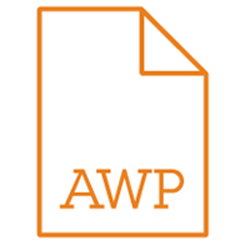
The Long and Short of It: The Evolving Shapes of Creative Nonfiction
Association of Writers and Writing Programs Conference, 2010
Technical Editing
During my doctoral program at Texas Tech, I added technical editing to my list of skills by studying with Angela Eaton (who literally wrote the book on the subject). Since then, I've regularly expanded my technical editing skill by freelancing broadly, by developing my own technical editing course at Park University, and by writing (to date) eight OER articles on the subject.
As a freelancer, I've worked on many major projects including
- dissertations and scholarly articles in accounting, linguistics, and other disciplines
- an NIH grant proposal
- an Alaska DOT&PF RFP response for a $30M project to benefit a remote community endangered by global warming
- Destination Danger, a tabletop game, including its successful Kickstarter campaign as well as its cards and manual
I've additionally worked on many minor projects such as resumes, cover letters, graduate school applications, brochures, flyers, info sheets, and more.
In addition to the standard tasks of substantive editing, copyediting, and proofreading, many jobs call for expertise in document design, so I have become skilled at Adobe InDesign and have developed as a typographer and visual designer.
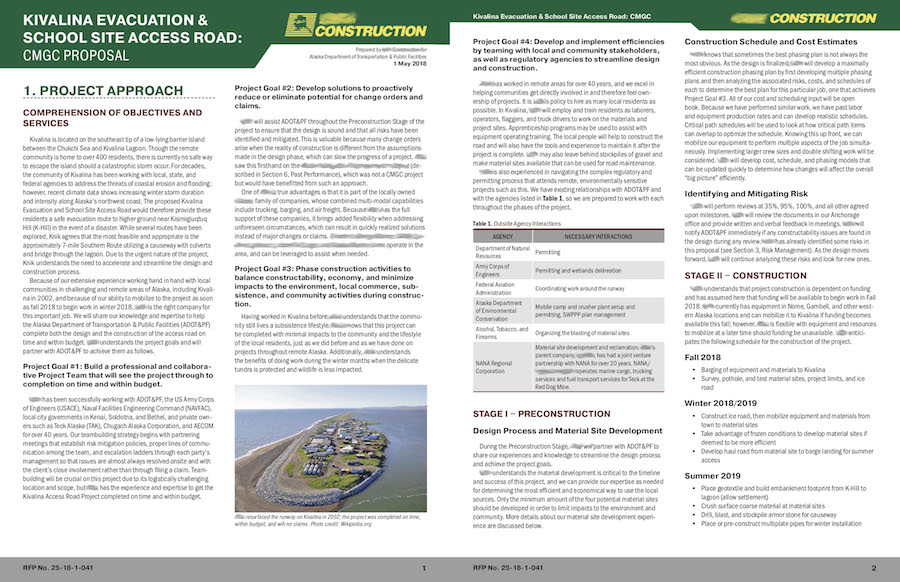
I used InDesign to ensure this high-stakes proposal stood out against competitors
I bring my expertise in technical editing and document design to my work as a professor; for example, I developed flyers and info sheets for my department's major and minor programs, which have helped to improve enrollment:
Instructional Design
As a technical communicator and academic, I take an outcomes-first approach to instructional design, beginning each project by identifying the desired learning outcomes and then developing assessments, activities, readings, and schedules to suit. I also adopt an iterative approach by deliberately gathering data to inform improvements. If these methods sound similar to the ADDIE and SAM processes, that's because I was trained on those methods in my doctoral program at Texas Tech.
Online Course Development
My skills in web design, accessibility, usability, and editing, plus my scholarly background in teacher preparation and online writing instruction pedagogy have made me an in-demand resource at my university when it comes to instructional design. In just five years at Park, I've developed seven online and hybrid courses, and I currently oversee the maintenance and teaching of seven more.
In 2020, I was asked by the provost to serve on the Faculty Review Team, which worked to mentor instructors completing rapid course developments in response to the COVID pandemic. I personally advised course developers working on seven courses across five disciplines including art, English, philosophy, psychology, and education.
In 2021, I was again invited by the provost to participate in a pilot project for assessing Park’s online course inventory. I helped develop a rubric for the project and evaluated almost a dozen courses as part of the pilot. I was subsequently asked to help present the projects findings to the university executive committee.
My current research project on instructor presence and autonomy is, at heart, an instructional design project examining how a more deliberate approach to designer for instructor presence can impact all users of an online course.
Curriculum Development
I am also involved in curriculum development, which considers similar issues and employs similar processes as course design but at a higher order of magnitude.
I was hired at Park to help develop the nascent Professional and Technical Writing (PTW) program, which had begun the year before with the establishment of an 18-hour PTW minor. In my time at Park, I have been instrumental in first creating a 12-hour PTW certificate and then a full-fledged 42-hour major, English and Professional Writing.
Though we had originally planned to introduce this major at a later date, the arrival of COVID prompted us to move our timetable forward. To ensure that the new major was available to both Parkville campus students and to distance students, I helped to redevelop several core courses for hybrid delivery.
I also served on the Liberal Education Redevelopment Committee, charged with revamping Park's general education requirements. For three years, I helped lead efforts to identify the weaknesses in the current requirements, research competing programs, brainstorm new program requirements, and write detailed recommendation reports on the program we eventually designed. Throughout this process, I worked with colleagues from across the university to meet the needs to departments, faculty, and students in all colleges and programs.
Technology and Software
I am a confident and capable user of technology, and I have a long history of teaching myself whatever software I need to know to accomplish my goals. Here is a sampling of the technologies and software I am conversant with.
- Zoom
- Slack
- Dropbox
- Google Drive, OneDrive, Box
- Microsoft Office
- Apple iWork
- Photoshop, Illustrator, InDesign
- Google Workspace
- SnagIt
- Camtasia
- iMovie
- Loom
- Canvas
- Blackboard
- Moodle
- Brightspace
- Panic Nova
- Bootstrap
- Wordpress
- Markdown
- HTML5
- CSS3
- PHP
- WCAG 2.2
